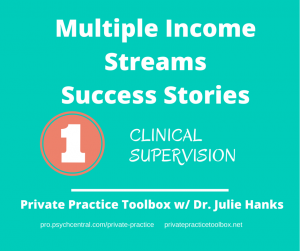As healers, we genuinely like to do our work. Guiding clients through the therapy process and seeing them make progress is why we do what we do. But if you're in private practice, you know there's a lot going on in the back end and that it's crucial to run an efficient and organized business.
4 Questions To Ask Yourself When Hiring a New Therapist
 One of the wonderful challenges that comes from having an abundance of business is the need to add new additional clinicians to your practice. But how exactly do you know who will be a good fit? How can you be sure to make the best choice that will benefit both the clients and your practice?
Not too long after opening Wasatch Family Therapy, I had created relationships in my community and built my online presence to the point that the demand for my services exceeded the supply I could provide. In other words, I needed to hire new therapists! Since I do not have a background in business, the process was entirely new to me, but thankfully I found that it happened quite naturally. I identified a few key criteria (beyond simply having required credentials and experience) that a candidate must possess in order for me to feel like he/she was a good enough match to hire. Here are 4 questions to ask yourself when meeting with an applicant who you may potentially bring in to your practice:
One of the wonderful challenges that comes from having an abundance of business is the need to add new additional clinicians to your practice. But how exactly do you know who will be a good fit? How can you be sure to make the best choice that will benefit both the clients and your practice?
Not too long after opening Wasatch Family Therapy, I had created relationships in my community and built my online presence to the point that the demand for my services exceeded the supply I could provide. In other words, I needed to hire new therapists! Since I do not have a background in business, the process was entirely new to me, but thankfully I found that it happened quite naturally. I identified a few key criteria (beyond simply having required credentials and experience) that a candidate must possess in order for me to feel like he/she was a good enough match to hire. Here are 4 questions to ask yourself when meeting with an applicant who you may potentially bring in to your practice:
-
Do I like him/her?
It may seem obvious, but it's critical that you feel comfortable with an individual who may be working for you. If you do not like to be in his/her presence, why would a client? It goes without saying that people skills are invaluable in this profession; it's what we do! Look for someone who puts you at ease, is warm and inviting, and who you find yourself attaching with. Be mindful of the emotional climate of your practice; you want to bring someone in who will work well with others, avoid drama, and of course help clients through their emotional struggles. Whether or not I genuinely like someone is the most important factor determining if I hire him/her (interestingly, this same criteria is also usually first on the list of what a client looks for in a therapist).
-
Were they born to be a therapist?
When looking to add to my practice, I look for individuals who I can sense were born to do therapy. It's common for practitioners to work with a lot of graduate level interns, and there are a select few who truly stand out; people who are naturally thoughtful, reflective, and sensitive to others' needs and feelings. I want someone who's always had the intuition and instinct of a therapist who just had to go through the official training to actually become one.
-
Are they emotionally stable?
This question is admittedly a bit delicate. While no one has it all together all the time, it naturally follows that someone who has a handle on his/her emotional issues can better assist clients in managing their own. Good therapists often use difficult past life experiences to relate to and help clients, so being "emotionally stable" doesn't necessarily mean you've never struggled mental health or relationship problems; quite the opposite can be true! To use an analogy, you cannot be a tour guide for other people to places you've never traveled. Still, I need my therapists to be healthy in order to best serve our clients.
-
Do they reflect the values of my practice?
As the owner of my practice, I need therapists who work for me to be similar to me in many ways. This is not to say, of course, that I am wanting someone with the exact personality, training, and expertise that I have. Still, there needs to be a continuity of approach and therapy style common to our clinicians. Throughout the years, we've had inquiring individuals wanting to see me specifically after hearing me speak or learning about me through social media. When I don't have an available opening to see someone new, I like to be able to state my confidence in another therapist and tell the prospective client that I've hand-selected a particular counselor that I wholeheartedly trust to do good work. I suggest that practitioners looking to hire new therapists identify a few specific values that are key to the philosophy and setting of their private practice to look for in applicants.
What do YOU look for when hiring new clinicians?
Let me know!
This post was adapted from an interview I did with Joe Sanok, LPC on" Practice of the Practice." Click here for access to the full podcast.
Join my Private Practice Toolbox Facebook group and connect with over 3100 therapists around the globe in 2 simple steps: 1) Click request to join the group and 2) Fill out this brief questionnaire before you’ll be added to the group.Get practice tips and blog updates in your inbox.
Get 52 FREE Blog Topics and prompts when you sign up for the PPT Newsletter (that’s a year's worth of weekly blog posts!)
 Want to grow your practice and make a difference beyond the therapy office? Check out my NEW Rock The Media School for Therapists - a 6-week online media + social media training designed for health and mental health practitioners. Learn how to build your media and your online presence so you can share your passion and practice with thousands of people! I hope you'll join me. Fall cohort begins Sept. 7, 2015.
Want to grow your practice and make a difference beyond the therapy office? Check out my NEW Rock The Media School for Therapists - a 6-week online media + social media training designed for health and mental health practitioners. Learn how to build your media and your online presence so you can share your passion and practice with thousands of people! I hope you'll join me. Fall cohort begins Sept. 7, 2015.
Multiple Income Stream Success Story #3: Teaching
 As we highlight more opportunities to use things that you enjoy doing and instances where others request your services to generate multiple income streams, I am sharing stories of other practitioners who have found ways to do just that:
We often forget that we have achieved at least a master's level education that can qualify us to teach others. There are many opportunities out there for teaching. Consider these options if teaching others is a passion for you. Teaching university or college courses, online courses or webinars, community workshops, or professional trainings.
As we highlight more opportunities to use things that you enjoy doing and instances where others request your services to generate multiple income streams, I am sharing stories of other practitioners who have found ways to do just that:
We often forget that we have achieved at least a master's level education that can qualify us to teach others. There are many opportunities out there for teaching. Consider these options if teaching others is a passion for you. Teaching university or college courses, online courses or webinars, community workshops, or professional trainings.
Getting started with teaching can be very easy; start with who you know. Contact your alma mater or other nearby colleges and universities. Many universities have positions available for adjunct faculty to teach entry level classes or to offer professional trainings to students in your field. Keep in mind, these types of teaching commitments usually last for extended periods, so be sure that they work for your timeline and make sense financially.
Presenting or developing online courses or webinars can be an easy, passive source of income. Once a training has been developed, you can easily record it and make it available for download or schedule various presentation times to virtually present it to others. This is an excellent area where your expertise can lead you to topics or needed courses. It also allows you the opportunity to reach well beyond the scope of your geographical location.
Starting small can often lead you to bigger opportunities and income growth. Consider providing small trainings at your practice for continuing education credits. Pam Dyson, MA, LPC, did just that when starting her play therapy trainings. When Pam originally started with trainings, it worked out to about 25% of her income. As those trainings became more successful Pam grew those trainings to the point where they provide 75% of her income. Pam shares this about her experience in growing teaching as an income stream.
“In 2010, I became an Approved Provider for the Association for Play Therapy. I began by offering a day long play therapy training, once a month, out of my private practice office, where attendees could earn the clock hours needed to become an RPT. I set up a website to promote the trainings, and within a year I was at capacity for each training. To meet the demand, I began offering four day-long trainings per month."
If you would like to learn more about Pam Dyson and the trainings that she offers, please visit DFW Play Therapy Training.
Community workshops are another area where teaching can be a beneficial source of income. Workshops are excellent because they often don't take much time to develop and also only last for brief periods. In my practice, we have sometimes taken areas or groups of individuals who have a need for instruction in a particular area and turned that into a workshop. I have done this when I see a consistent or similar problem in my clientele. At one point, I was working with many women who were suffering from a lack of sex drive. I developed a workshop for cultivating desire in marriage that I would present for a few hours every few months.
I encourage you to keep in mind doing those things that you are passionate about. Teaching may not be your cup of tea, but there are plenty of other ways to generate multiple streams of income. If you're still having trouble coming up with something, refer back to my 5 Key Questions to help you get started.
Visit the new PrivatePracticeToolbox.net for webinars and consulting services
Visit the new PrivatePracticeToolbox.net for webinars and consulting services
FREE Download Get 52 Blog Post Topics & prompts when you sign up for PPT list
Join my Private Practice Toolbox Facebook group and connect with 3200 therapists around the globe in 2 simple steps: 1) Click request to join the group and 2) Fill out this brief questionnaire before you’ll be added to the group.
Multiple Income Streams Success Story #1: Supervision
 In the past, I've written about increasing revenue using multiple forms of income (income not related to direct client hours). I offered five key questions to find areas where you might be able to enjoy adding some extra income to your private practice. In this series, I want to share the successes of private practitioners who have used these concepts to find areas that not only increase their income, but help reach their ideal clients and also fuel their passions.
Amy Tatsumi, MA, LPC, found that she could garner additional income and give back to the psychotherapy community by providing supervision to others training in her field. Amy estimates that 25-30% of her income comes from supervision and consultation services.
In the past, I've written about increasing revenue using multiple forms of income (income not related to direct client hours). I offered five key questions to find areas where you might be able to enjoy adding some extra income to your private practice. In this series, I want to share the successes of private practitioners who have used these concepts to find areas that not only increase their income, but help reach their ideal clients and also fuel their passions.
Amy Tatsumi, MA, LPC, found that she could garner additional income and give back to the psychotherapy community by providing supervision to others training in her field. Amy estimates that 25-30% of her income comes from supervision and consultation services.
 “I believe that supervision and consultation are the biggest ways that I can give back as a therapist. Supporting clinicians in their journey to become sound, connected, and grounded psychotherapists has a powerful ripple effect. The supervisee, as well as all of their future clients, are impacted by the supervision process in their growth and development. In my private practice, I offer both individual and group clinical supervision and consultation for post graduate candidates and post license and seasoned practitioners in art therapy, counseling, and psychotherapy.”
“I believe that supervision and consultation are the biggest ways that I can give back as a therapist. Supporting clinicians in their journey to become sound, connected, and grounded psychotherapists has a powerful ripple effect. The supervisee, as well as all of their future clients, are impacted by the supervision process in their growth and development. In my private practice, I offer both individual and group clinical supervision and consultation for post graduate candidates and post license and seasoned practitioners in art therapy, counseling, and psychotherapy.”
To learn more about Amy and her services, visit amytatsumi.com
You might find that the fee you can charge for supervision is similar to your hourly clinical rate. I recommend researching what the standard rates are for supervisors in your area. Be sure that you are meeting all the qualifications for supervising a particular discipline as requirements differ depending on the field (social work, professional counseling, psychology, marriage & family therapy) and on in which state you practice. It is common that supervisors meet requirements for a minimum number of years of licensure or have specialized training as a supervisor. It's also important to research and understand which groups of trainees you should or should not supervise.
Income from supervision can be accomplished in a few ways. I have found in my own practice that hiring interns to meet with clients has been a successful way of creating additional income for the practice. It allows your practice to see more clients than only having one provider. You can also provide direct supervision to clinicians from other agencies. There are many times when clinicians may not have access to the type of supervisor necessary to meet the licensing requirements. They must then seek someone who can provide that. You can also provide supervision for other agencies themselves. Agencies may find that they have a need for someone to supervise employees for similar reasons that clinicians may seed outside supervision. Creating a relationship with an agency for supervision could be a consistent income stream. Consider all your options, then implement the style that works best for you.
If supervision isn't the income source you're looking for, don't worry; I'll be sharing other success stories and ideas for multiple avenues for revenue. I'd love to hear from you about areas where you have found the opportunity to generate income and, hopefully, some excitement for you.
Visit the new PrivatePracticeToolbox.net for webinars and consulting services
FREE Download Get 52 Blog Post Topics & prompts when you sign up for PPT list
Join my Private Practice Toolbox Facebook group and connect with 3200 therapists around the globe in 2 simple steps:
1) Click request to join the group and
2) Fill out this brief questionnaire before you’ll be added to the group.
7 Factors That Affect Private Practice Income
Maintaining a successful therapy private practice takes a lot of time, effort, and skill. There are countless aspects of your business that require painstaking attention in order for things to run smoothly. It can be difficult to work so hard and still sometimes experience economic uncertainty, so it's important to analyze the causes of financial inconsistencies. Here are 7 factors that affect private practice income: 1) Client Retention Rates
The ability to keep a client engaged in meaningful and helpful therapy is a learned skill that greatly impacts your private practice income. It doesn't get as much attention as generating new referrals, but in my experience it is equally important. While it would inappropriate to continue seeing an individual who no longer needs or desires therapy, keeping clients committed to the therapy process and attending sessions regularly not only helps them adequately work through their struggles and meet their goals, it also helps practitioners maintain their business. Conversely, clients who prematurely discontinue therapy put both themselves and their mental health professionals at a disadvantage.
2) The Number of New Referrals
Acquiring new clients is of course an excellent way to increase income, but it can be hard to predict the ebbs and flows of exactly when new individuals will seek your services, so it's not a guaranteed strategy. I have found that it's helpful to begin tracking the number of new referrals and then chart them so you can anticipate and prepare for business lulls in coming years.
3) Economic Climate
The general state of the economy can greatly impact whether clients will go to sessions as often or are willing to pay out of pocket. For some individuals, therapy is considered a necessity, while others may be view it as a luxury. Your income as a practitioner is in part dependent on the current economy of your community and state.
4) Season/Time of Year
The time of year can affect when current and/or potential clients ramp up their therapy time, as well as when they often take breaks. In my experience, the last two weeks of December is when everyone (clients and providers) take time off for the holidays. Just as with new referrals, tracking the dips in client numbers can help you save for those times when you will not be getting paid.
5) Fee Collection
You may have a steady stream of clients, but your income can be significantly lowered if a number of them have outstanding financial balances. How much money do people owe you? Are you good at collecting your fees? If you work with insurance companies, are you able to get reimbursed in a timely manner? All of these play a major role in the financial stability of your private practice (click here for how to set high expectations and create firm financial policies).
6) Moving Office Location
Relocation will almost certainly affect your private practice income. Depending on how far you move, it can take time to develop relationships, create a strong web presence, and acquire referral sources for therapy. Even if you are moving to another location in the same city, you may find that this may temporarily impact your client hours.
7) Leave of Absence/Taking a Vacation
One of the biggest complaints I hear from private practitioners is that if they are sick and have to miss a few weeks, they are left without an income. Taking some time off from seeing clients means we are not getting paid; understandably, this can create financial concerns.
These and other factors (some within your control, others not) can greatly affect how financially stable your practice will be. And as one of my goals is to help therapists experience income stability, I again strongly encourage you to pursue multiple income streams as a way of advancing professionally, serving your community, and also providing for your own needs.
Click here to access my webinar about how to develop multiple income streams.
Get practice tips and blog updates in your inbox! Sign up for the Private Practice Toolbox Newsletter here.
Join my Private Practice Toolbox Facebook group and connect with 3100 therapists around the globe in 2 simple steps:
1) Click request to join the group
2) Fill out this brief questionnaire before you’ll be added to the group.

As healers, we genuinely like to do our work. Guiding clients through the therapy process and seeing them make progress is why we do what we do. But if you're in private practice, you know there's a lot going on in the back end and that it's crucial to run an efficient and organized business.